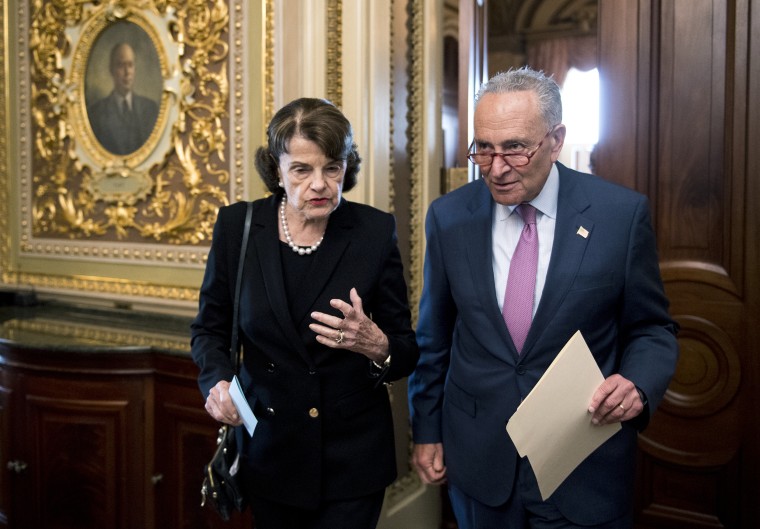WASHINGTON — With President Donald Trump on the verge of announcing a Supreme Court nominee, Democrats are coalescing around a focus on health care — and the prospect that millions could lose it during a pandemic — ahead of an ugly confirmation battle, key senators and aides said.
The strategy aims for the sweet spot: It's a political winner for Joe Biden and Democratic candidates among liberals and swing voters across the country. And it has urgency, with the law headed back to the Supreme Court one week after Election Day as the country's coronavirus death toll has topped 200,000.
Trump, who is supporting the Texas-led lawsuit to invalidate the Affordable Care Act, also known as Obamacare, has repeatedly indicated that he would nominate judges who would rule against it.
"It'll be a major focus," Sen. Dianne Feinstein of California, the top Democrat on the Judiciary Committee, said in an interview Thursday. "There are others."
As a candidate, Trump criticized Chief Justice John Roberts for voting to uphold the Affordable Care Act. "My judicial appointments will do the right thing, unlike Bush's appointee John Roberts on Obamacare," he tweeted then. In February 2016, Trump tweeted: "Roberts could have killed ObamaCare twice, but didn't!"
At a hearing Thursday, Feinstein said, "We should be rightly concerned that he's going to keep his word." Other Democrats followed in highlighting the issue.
Asked whether Trump stands by those promises, White House spokesman Judd Deere said only that the president will choose someone from his list of prospects and that his "nominee will be someone who believes in the rule of law and our Constitution as written."
The emerging focus comes as Trump says he will announce his pick Saturday to replace liberal icon Ruth Bader Ginsburg, who died last Friday at 87. Lacking the power to thwart his nominee, Democrats are searching for a strategy to maximize their chances of winning the election, which for them means hitting pause on talk of retaliation or adding seats to the Supreme Court and instead focusing on the consequences of a 6-3 conservative court.
"The Republicans have voted 25 times to do away with health care, especially pre-existing conditions. Now they figure this is a way they can do it," Sen. Patrick Leahy, D-Vt., a senior member of the Judiciary Committee, said in an interview.
Trump's nominee is likely to decline to answer questions about how he or she would decide on the ACA, citing the impropriety of prejudicing a case that could come before the court. But his past remarks are likely to loom over the confirmation battle, with the health care law in a precarious position. It was upheld by a 5-4 vote in 2012, and one of the justices in the majority was Ginsburg.
The progressive judicial group Demand Justice plans to spend $10 million to fight the nomination, Executive Director Brian Fallon said. He added that its research shows that the most effective messages are the prospect of overturning the ACA and rushing a nomination in the absence of Covid-19 relief.
'They're going to throw crap at the wall'
Republicans senators in difficult re-election battles have struggled with Obamacare, as their party lacks a replacement plan in case their efforts to eliminate the law succeed.
Sen. Ben Sasse, R-Neb., a member of the Judiciary Committee, bristled when asked about Democrats' plans and indicated that he expects the nominee to be Amy Coney Barrett, who is widely seen by senators as the front-runner.
"The Democrats are going to highlight any issue, anywhere in American life, to try to say the kind of BS about Amy Barrett that they've tried to say. They're going to throw crap at the wall, see what sticks and then make it 10 times more extreme," he said.
Unprompted, he took a swipe at fellow Judiciary Committee member Mazie Hirono, D-Hawaii.
"You can promise that Mazie will say something crazy," Sasse said.
Asked for her response, Hirono said in a statement: "That's funny coming from one of the Senate's most self-righteous trolls."
Josh Hawley, R-Mo., a Judiciary Committee member who supported the anti-ACA lawsuit when he was attorney general of Missouri, said he didn't know whether another conservative justice would change the outcome of the case.
"I don't have any prediction of how the court will vote or what it will mean," Hawley said. "The court has surprised me every time they've taken up an ACA case."
The Judiciary Committee is aiming to hold hearings to advance a nominee the week of Oct. 12. Republicans hold a 12-10 majority, but three members face competitive re-election bids against Democrats who have focused on protecting Obamacare: Thom Tillis of North Carolina, Joni Ernst of Iowa and the panel's chairman, Lindsey Graham of South Carolina.
The focus on health care is a break with Democrats' traditional emphasis on cultural issues, including abortion, in laying out the stakes around control of the high court. Yet the fate of Roe v. Wade could still be a hot topic, with some Republicans openly calling for its undoing so states could criminalize abortion.
A Senate Democratic said the party "would have taken at any point an offer to make this election about health care."
"So let's take it," said the aide, who discussed strategy on condition of anonymity and alluded to Democrats' 2018 victories while running on the ACA. "It's very simple: It's a very credible and direct argument to say in three consecutive weeks we will have a confirmation, an election and then a case to overturn the ACA. It is three strikes in a row."


